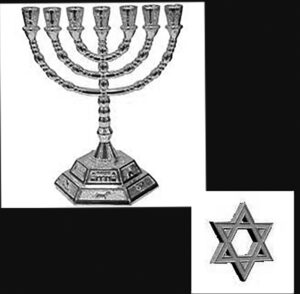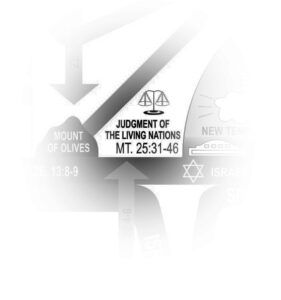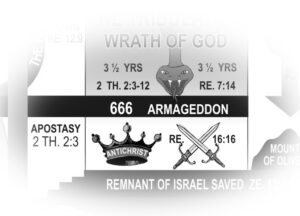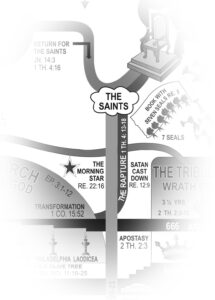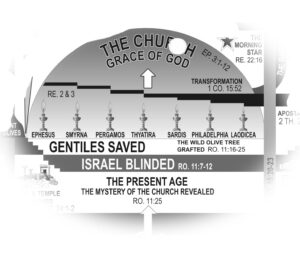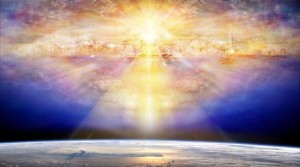 ‘After These Things’ Chapter 4.9– What God in His Goodness will yet do for Israel – and what it Means for us
‘After These Things’ Chapter 4.9– What God in His Goodness will yet do for Israel – and what it Means for us
From our book ‘After These Things – Summaries of John Nelson Darby’s Papers on Prophecy – and more…’ Compiled by Daniel Roberts. For more about this book click on the picture or CLICK HERE
A summary of the Ninth Lecture by J N Darby on the Present Hope of the Church – Geneva 1840 entitled Israel’s Failure and Dispersion; Promises of Restoration.
4.9 What God in His Goodness will yet do for Israel – and what it Means for us
The Restoration of the Jews and God’s Promises to Israel
The Promises which sustained a faithful Remnant
Israel must be renewed in heart to receive the promises of Canaan.
The Restoration of the Jews and God’s Promises to Israel
Ezekiel 37 shows us forcibly what God in His goodness will yet do in Israel’s favour.
‘Prophesy upon these bones, and say unto them, O ye dry bones, hear the word of the LORD. Thus saith the Lord GOD unto these bones; Behold, I will cause breath to enter into you, and ye shall live … and ye shall know that I am the LORD. … Take thee one stick, and write upon it, For Judah, and for the children of Israel his companions: then take another stick, and write upon it, For Joseph, the stick of Ephraim, and for all the house of Israel his companions: and join them one to another into one stick; and they shall become one in thine hand. … So shall they be my people, and I will be their God. And David my servant shall be king over them’.
The restoration of the Jews is founded upon the unconditional promises that God made to Abraham. But we have also seen how Israel undertook to obey in their own strength, taking on the promises under the covenant made in the wilderness. Notwithstanding their miserable failure, thanks to the mediation of Moses, God was able to bless the people. Israel again failed after they had been given the land. He raised prophets to convict them of the sin into which they had fallen, bearing with His people ‘until there was no remedy’ (2 Chron. 36:16). Thence severe judgment came upon them. God executed judgment only after extraordinary patience.
The prophets also showed the faithful ones that the counsels of God towards Israel would not be put aside. God would accomplish everything that He had spoken about through the Messiah. It was when Israel failed, that the promises of their re-establishment became precious to the faithful remnant of the people since the unfaithful majority would come under judgment.
The History of Israel
Joshua had said to the people, ‘Ye cannot serve the Lord’, but the people insisted, ‘Nay, but we will serve the Lord’ (Joshua 24:19,21) They had been led into the land of promise, enjoyed the fruits of grace, and now they were undertaking to obey the Lord in their strength.
Judges 2 summarises their complete failure. The children of Israel made alliances with the people of the land, so God said, ‘I will not drive out your enemies from before you, but they shall be as thorns in your sides. Then the cycle started:
The children of Israel did evil in the sight of the LORD. . . they forsook the LORD, and served Baal and Ashtaroth. (v. 11,13)
The anger of the LORD was hot against Israel, . . . and he sold them into the hands of their enemies round about, so that they could not any longer stand before their enemies. (v. 14)
Nevertheless, the LORD raised up judges, which delivered them out of the hand of those that spoiled them. (v 15)
They would not hearken unto their judges, but they went a whoring after other gods, and bowed themselves unto them: (v 16)
When the LORD raised them up judges, then the LORD was with the judge, and delivered them out of the hand of their enemies all the days of the judge: for it repented the LORD because of their groanings by reason of them that oppressed them and vexed them. (v 18)
When the judge was dead, that they returned, and corrupted themselves more than their fathers, in following other gods to serve them, and to bow down unto them; they ceased not from their own doings, nor from their stubborn way (v 19)
So the cycle continued: always the same – kindness on the part of God, ingratitude on the part of man. This constant distaste of man’s heart for God is an unhappy subject to dwell on.
Eli was the high priest, the judge and head of Israel. However, the glory of Israel had been cast down to the ground: ‘The ark of God taken, and the two sons of Eli, Hophni and Phinehas, were slain.’ Eli himself died, and his dying daughter-in-law named her child, Ichabod, saying, ‘The glory is departed from Israel’ (1 Samuel 4:11,21)
Samuel was raised up of God. When the people said they wanted a king like the rest of the nations, God showed that He had been rejected: 1 Sam. 8:6, 7. ‘And the Lord said unto Samuel, Hearken unto the voice of the people in all that they say unto thee: for they have not rejected thee, but they have rejected me, that I should not reign over them.’ Saul failed: Israel had failed under prophet, priest and king,
David and Solomon – God gave David, a type of Christ to Israel, as he is the father of Christ according to the flesh. Under Solomon, Israel becomes rich and glorious. But the people transgressed under both these two princes. ‘The Lord was angry with Solomon, because his heart was turned from the Lord God of Israel.’ (1 Kings 11:9). Royalty, raised up by God Himself, failed and judgment passed upon it – though it was not executed until the reign of Zedekiah
Ahaz and Manasseh – The ten tribes were unfaithful. In the apostasy of Ahaz, who took the heathen altar from Damascus to Jerusalem, the hope of Israel failed. Only God’s promises remained.
‘And the Lord God of their fathers sent to them by his messengers… but they mocked the messengers of God, and despised his words, and misused his prophets, until the wrath of the Lord arose against his people, till there was no remedy’ (2 Chron. 36:15, 16). That was the end of their existence in the land of Canaan. The name of Lo-ammi (not my people – see Hosea 1:9) is at last written upon them, and they were deported to Babylon. These tribes were lost – at least as far as their identity is concerned.
The Promises which sustained a faithful Remnant
This is the promise: ‘I will appoint a place for my people Israel, and will plant them that they may dwell in a place of their own, and move no more; neither shall the children of wickedness afflict them any more as beforetime … I will establish his kingdom. He shall build me an house, and I will establish his throne for ever. I will be his father, and he shall be my son.’ (2 Samuel 7:10,13). In Hebrews 1:5, these words apply to Christ – ‘For unto which of the angels said he … I will be to him a Father, and he shall be to me a Son?’ All the promises made to Abraham and to his seed are placed in the safekeeping, and gathered together in the Person, of Jesus, the Son of David.
‘In that day (time of great trouble) shall the branch of the Lord be beautiful and glorious, and the fruit of the earth shall be excellent and comely for them that are escaped of Israel.’ (Isaiah 4:2-4). Judah and Israel will be reunited, and the nations will be assembled to the throne of God. Isaiah gives so many references to Christ and the blessings of Israel from its Messiah.
Happy Times for Israel
Happy times for Israel have not yet been realised. They certainly were not realised at the time of the return from Babylon, or since[1].
Ezekiel 37 gives the future re-establishment of Israel – the joining together of the two parts of the nation and their return into the land. This is yet to come. God is their God; their King is present, and the nations knowing that Israel’s God is Jehovah. His sanctuary shall be in the midst of them for evermore. God will never hide His face from his people again.
There is a touching passage as to the thoughts of the Lord concerning His people in Jeremiah 32:37-42. Having given them the promises of blessing in grace, and assured them that He would be their God, the Lord says, ‘And I will plant them in this land assuredly, with my whole heart and with my whole soul. For like as I have brought all this great evil upon this people, so will I bring upon them all the good that I have promised them’.
God gives a new heart to the Remnant, the nucleus of the future nation.
Israel must be renewed in heart to receive the promises of Canaan.
Israel must be born again to enjoy those terrestrial promises which belong to her. God must cause them to walk in His statutes by giving them a new heart, and then, but only then, they will enjoy the blessings foretold for them.
The Lord spoke to Nicodemus about the need of being born anew[2] – of water and of the Spirit in order to enter into the kingdom of God. He was speaking of the Jews, and Nicodemus should have known what God had said through Ezekiel: ‘A new heart also will I give you, and a new spirit will I put within you: and I will take away the stony heart out of your flesh, and I will give you an heart of flesh’ (ch 36:26).
That is why He says, ‘If I have told you earthly things, and ye believe not, how shall ye believe, if I tell you of heavenly things?’ (John3:12) – about the glory of Christ exalted in heaven, and the church, His companion.
Is Zion the Church?
These scriptures apply to Israel. Some misapply them to the Church, particularly in Ezekiel 35 onwards. They assert that in these chapters, Zion refers to the church. But this is impossible. We read, ‘Zion said, The Lord hath forsaken me.’ (Isaiah 48:14). The Church will be with Christ. Were Zion the church, how could it be forsaken?
When it says, ‘All the nations shall be gathered unto it.’ it does not refer to the return from Babylon, because it goes on, ‘In those days the house of Judah shall walk with the house of Israel, and they shall come together . . . to the land that I have given for an inheritance unto your fathers.’ (Jeremiah 3:17-18). This scripture cannot refer to the Church, nor to the present time when the ten tribes are not found.
‘Who is it that the Lord has broken down, thrown down, and destroyed? The same that He will build and plant.’ (Jeremiah 31:28). It seems it has been asserted, that in these chapters Zion refers to the Church. It would be unreasonable to apply all the judgments to Israel, and all the blessings concerning the same persons to the Church!
We have the Holy Spirit; Israel will have the Branch. The word of God never presents the Holy Spirit as the Branch of David.
Our Blessings
We participate in the blessings of the good olive-tree, but our joy has not dispossessed the Jew (the natural branch) of that which belongs to him. We have been grafted into Christ. If we are Christ’s, we are Abraham’s children, and partake of all that is spiritual. The church has only one Father, who is the Father of our Lord Jesus Christ. As Moses was the mediator for Israel (the type), we have the mediation and the presence of Jesus. In Him, the promises are accomplished.
‘Now all these things happened to them as types, and have been written for our admonition, upon whom the ends of the ages are come.’ (1 Corinthians 10:11 Darby) On one hand, the heart of man always fails, and on the other hand, there is the faithfulness of God who never fails. He will fulfil all His promises, providing strength to surmount all the power of Satan and the wickedness of man.
We have seen the history Israel sinning under the law: but we can see the same in every one of our hearts. No sooner does God place us in a position of responsibility than we fail. But behind our failure, there is strength in the revelation of the counsels of God, and in His unconditional promises. If we place ourselves before God, we recognise that it is only His grace that sustains us and relieves us from the situation we find ourselves in because of sin.
As to us Gentiles, the execution of God’s judgment has been suspended for about 2,000 years. God is still drawing upon all the eternal resources of His grace to find those who will listen to His testimony of salvation.
In all this, we see the revelation of the character of Jehovah. Israel is the theatre upon which God has displayed His perfect character. Though these things have happened (or will happen) to Israel, they are for our benefit. We should think not only of the failure of Israel but also of the goodness of God – our God. Were God to fail in His gifts towards Israel, He could fail in His contributions towards us.
Conclusion
JND Concludes, ‘Admirable patience! Infinite grace of Him who interests Himself in us, even after our rebellion and iniquity! To Him be all the glory!’
In all this, we see the revelation of the character of Jehovah. Israel is the theatre upon which God has displayed His perfect character. Though these things have happened (or will happen) to Israel, they are for our benefit. God in His goodness will never fail in His gifts towards Israel: He will not fail us either.
[1] It is important to note that even if Jews have repopulated the land and the Israeli state established in 1948 (though not the area of the land, which was a subject of the six-day war in 1967 and remains a contentious issue now. A Jew who understands God’s thoughts (though he/she may be in unbelief as regards their Messiah, cannot countenance the ‘West Bank’ as part of a ‘Palestinian (Philistine) state. A true Christian however can leave it all in God’s hands. God will see to it that Israel gets the full land (a bit extended for the Millennium), and that sites needed – especially that currently occupied by the Dome of the Rock and the Al-Aqsa Mosque – the site of the temple, the threshing floor of Oman (or Araunah).
[2] Again, a frequent misapplication. ‘New birth’ applies to the whole nation of Israel and is contained in prophesy. Here it does not relate to the sovereign work of the Spirit of God in the soul.


